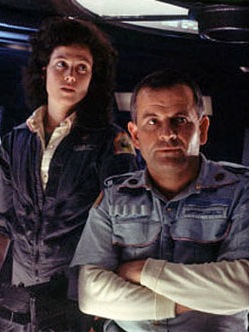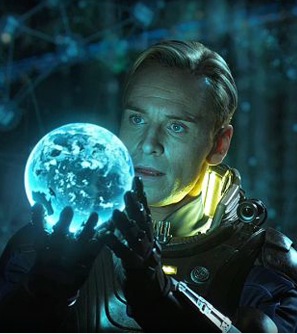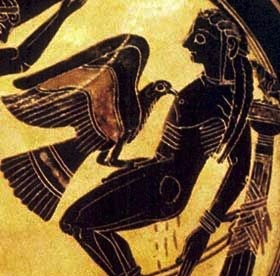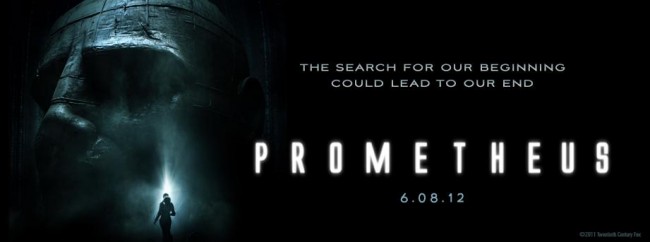In the opening moments of Prometheus, a strange, monk-like alien – looking more like a human than the xenomorphs we’re used to from 1979’s Alien, the film with which Prometheus shares a universe – disintegrates himself into a river. It’s a ritual, and it appears to be one of excruciating agony, but he’s inflicted this upon himself on purpose: we don’t know it yet, but he’s creating life.
Prometheus is perhaps the most frustrating film of the year. Not because it does anything particularly bad to the Alien legacy – this is, after all, a franchise that has survived Alien3, Alien Resurrection, and some gigantically-misjudged attempts to combine it with the Predator franchise – but because the great film it could have been is so infuriatingly apparent, you want to take to the thing with a hatchet. Or, rather, the Final Cut Pro equivalent.
 One of the many, many great things about the original Alien film is how the crew is made up largely of engineers and miners. These are not scientists with lofty ambition; they’re easily-relatable working stiffs a long way out of their depth. Now, I like films about scientists with lofty ambition, but Hollywood so often fumbles this concept that most of the time I prefer they tried something different. Which is what I was thinking during Prometheus.
One of the many, many great things about the original Alien film is how the crew is made up largely of engineers and miners. These are not scientists with lofty ambition; they’re easily-relatable working stiffs a long way out of their depth. Now, I like films about scientists with lofty ambition, but Hollywood so often fumbles this concept that most of the time I prefer they tried something different. Which is what I was thinking during Prometheus.
Gone is the effortless banter of Alien and characters revealed through action, replaced with some pretty forced characterisation. ‘I ain’t here to make friends!’ proclaims one character for some unknown reason. ‘I just love rocks!’ says another, because his world begins and ends with the fact that he is a geologist. Short of a flashing sign proclaiming such scenes to be CHARACTER MOMENTS, this is pretty excruciating stuff.
Our main protagonists are, in fact, scientists, trying to locate what they believe to be the source of life on Earth. And when Elizabeth Shaw (Noomi Rapace) – no doubt an alt-universe version of Doctor Who’s scientist Liz Shaw – announces that this multi-year, ultra-expensive expedition is based on her ‘faith’, warning claxons should begin to sound.
‘Faith’ is an interesting topic to explore, but only if you actually take the time to explore it. Simply saying the word ‘faith’ every so often, showing a close-up of a cross from time to time, and waving lazily at what is generally understood to be a conflict between faith and science, is forced and boring, and adds nothing to the story. In fact, it’s so poorly handled that it often detracts.
Additionally, having scientists act in the most unscientific way possible at every turn does not help to paint some faith-based conflict: it just frustrates those of us with even the mildest passing knowledge of how scientists operate.
The film’s biggest problem is this mishandled theme, and it’s even more baffling considering what an inspired triumph its other theme is.
Prometheus is about fatherhood.
 Many people have cited Alien as being the ultimate film about childbirth (and, consequently, motherhood). Prometheus – which, again, is set in the same universe as Alien – does not try to directly replicate this idea, but finds an absolutely inspired alternate spin on it.
Many people have cited Alien as being the ultimate film about childbirth (and, consequently, motherhood). Prometheus – which, again, is set in the same universe as Alien – does not try to directly replicate this idea, but finds an absolutely inspired alternate spin on it.
From that opening scene in which a deliberately-male alien creates life, through to the daddy issues felt by both Elizabeth and another character, the man’s role in the creation of life is the topic du jour.
However, unlike the hand-waving tepidness of the faith undertones, the fatherhood theme has a very well thought-out spin: the father is perpetually absent.
Elizabeth’s father, who died when she was young, is physically absent. The other character’s father – and I’m obviously playing awkward pronoun games pains to avoid this minor spoiler – is emotionally absent. And the entire central plot is predicated on the idea of the human race’s father. Where did he go? Why did he create us and then leave? The human race has reached maturity, left home, and is now ready to find out.
As the film played on and I realised where it was going, I became annoyed with a scene that I initially perceived to be a sharp departure from this idea. (A big spoiler is to come, to stop reading now if you haven’t seen it.) When Elizabeth realises something is growing in side of her, she goes to great pains to – let’s not beat around the bush – get an abortion. At first, I imagined this terrifically-tense scene to be a somewhat-clumsy lurch back to the well-trodden theme of motherhood, but this pregnancy is unwanted. Yes, all of the ‘pregnancies’ in the Alien films are unwanted, but none has been so immediately and declaratively rejected as this one. Elizabeth has been violated against her will by a father who has left to pursue his own interests, and must take care of the resulting spawn herself. At first glance, this seems not unlike anything else within the franchise, but the subtext plays completely differently within the context of this film.
 And none of this is can be in doubt when the characters overtly refer to the original legend of Prometheus, Greek mythology’s father of mankind.
And none of this is can be in doubt when the characters overtly refer to the original legend of Prometheus, Greek mythology’s father of mankind.
Much of the rest of the film is in as much conflict with itself as the two jostling themes of faith and fatherhood. There may be poorly-depicted characters who react to everything within the stringent prism of their one-sentence outline, but there is also Michael Fassbender’s show-stealing robot David, who manages to be the most interesting and (intentionally) funny character in the entire film. There may be clanging, awkward dialogue, but those battle against some genuinely exciting moments of life. And then there is that ending, which basically encompasses the idea that something good and something bad can merge to create something entirely confusing. It’s easy to appreciate what they were going for, but I’m not convinced the result truly works.
Prometheus is the perfect analogy for the Alien franchise. After an incredible, genre-redefining opening instalment, its father – Ridley Scott – disappeared, and the franchise lost its way. Now they’ve located him again, and, as with the fathers in the film, found him to be extraordinary and disappointing at the same time.

